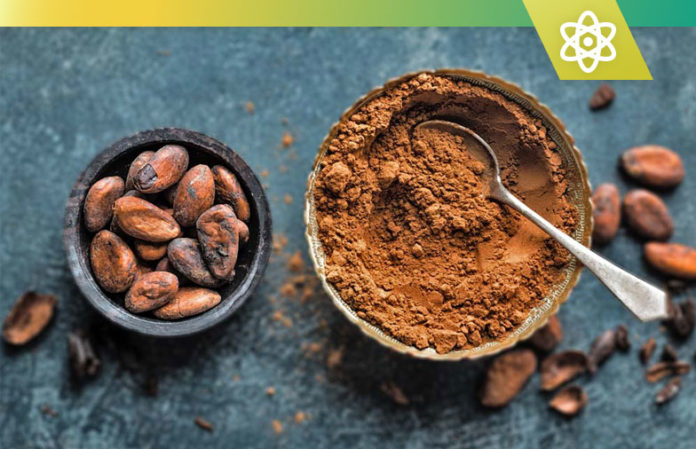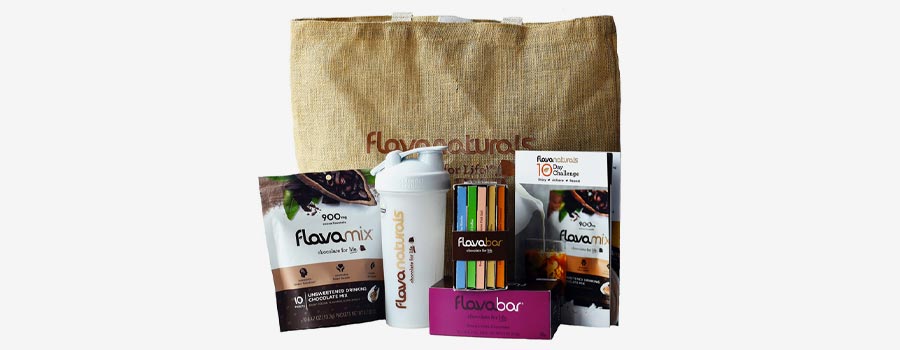The cocoa flavanols story is quite impressive. Before we get into reviewing the top 5 best cocoa flavanol supplements in 2023, it is important to break down what flavonoids are, the differences between cocoa and cacao and how this ‘chocolate extract' could be the next big superfood trend in the world.
While the cocoa flavanol phenomena is not new, back in October 2014, cocoa flavanols got its first major mainstream press attention due to a study that found dietary cocoa flavanols to actually reverse age-related memory decline in elderly adults. Since then, the naturally-occurring plant-based bioactive nutrients found in cocoa have been on the map for all sorts of health benefits ranging from cardiovascular heart health, brain support and energy performance.
These flavanols are found in a variety of whole foods, including grapes, wine, tea, blueberries and many more – but cocoa is the richest source of flavanols in the world. To kick things off, let's break down the difference between the types of chocolate, then the research on the best cocoa flavanols product to supplement and wrap up with the latest science and ongoing medical literature unfolding around the promise of these cocoa flavanols.
Contents
How Are Cacao and Cocoa Different?
The supplement industry has been constantly evolving for decades, but the most recent attention has been on that of cacao and cocoa supplements. The terms themselves are rather interchangeable in some circumstances but are grossly different in others. Let’s first dive into the difference between cacao and cocoa.
Anyone that has made a chocolate purchase may have noticed that some packages list cacao as the ingredient, while others are listed as cocoa. Some differences can completely change the effects of a product, while others are merely a matter of the term used. The chocolate itself is made with cacao beans, though some experts use cocoa to describe these same beans. Others choose to use “cacao” to refer to the beans and pods, while “cocoa” is considered to be the powder leftover after the processing. However, the two uses do not have much in difference, and they're still isn’t a global definition that has risen to the top.
In terms of health, the difference is a little fixed. The range of carbohydrates found in cacao and cocoa is small, going as low as 6 grams and as high as 20 grams in a single ounce. Sugars increase as the bitterness is sweetened, but both substances contain flavanols, which are antioxidants that have a substantial amount of health benefits for consumers.
Here is a flavonoids family of the plant-derived nutrients showing how flavanols (tea, blueberries, cocoa), anthocyanidins (from berries, red cabbage, cherries), flavanones (oranges, grapefruit, lemons), flavones (parsley, peppers, celery), and flavonols (onions, apples, tea).
While chocolate remains high in calories, cacao is known for high amounts of iron and tryptophan, offering necessary nutrients to the body. The variations that have the least amount of sugar are dark chocolate and unsweetened cacao products, which can help consumers avoid dental and weight gain.
When it comes to flavor, cacao is notably more bitter than cocoa, which is why sugar is sometimes added to make it more palatable. Furthermore, cocoa often has fewer antioxidants as a result of the process used to sweeten it. Though flavanols are more preserved in cacao, so if you are purchasing in order to use for baking, the baking process often destroys even more of it, so smoothies and other cold recipes are the best way to get the most nutritional benefits from cacao.
Ultimately, the world has been divided on which of these two terms should be used, making the understanding of which one is in any given product much more difficult. Still, one of the few statements that are agreed upon is that dark chocolate with more than 70% cocoa offers the desired health benefits that consumers desire from its minerals and flavanols.
Now, as the science understands the primary differences between cocoa and cacao, now they are breaking down the layers of cocoa flavanols and its four stereoisomers such as epicatechin that are believed to provide the biggest benefit to the cardiovascular system and cognitive enhancement. But, as mentioned, to get the studied dosage amount of cocoa flavanols, an individual would have to consume way too much chocolate to get the optimal amount of flavanols and thus the rise in pure cocoa flavanol powder supplementation has become the new trend.
Top 5 Best Cocoa Flavanol Products in 2023
With so many chocolate-based products on the market, finding the right option may take a little guidance. Especially when you realize there is a big difference between pure cocoa flavanol extract supplements and essentially pure dark chocolate powder. These are very different as the cocoa flavanols are a potent and superior compound within chocolate.
To get the optimal dose of these highly beneficial cocoa flavanols, here is some research to review on the top 5 supplements available right now that focus on delivering these cacao plant extracts. As it stands today, there are not many cocoa flavanol powder supplements available due to the specialized nature of these products so let's cover the way that they set themselves apart from other brands.
CocoaVia
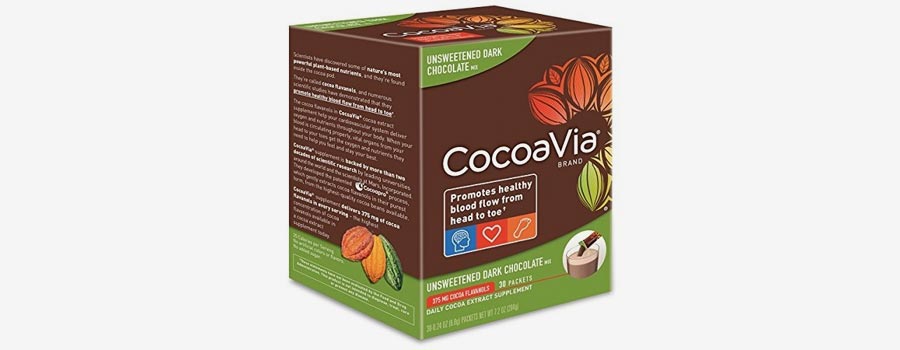
Find Lowest Price for CocoaVia on Amazon.com
CocoaVia is a supplement that offers 450 mg of cocoa flavanols with each serving, offering support for the brand and heart with healthy blood flow. The formula specifically includes cocoa extract, using the company’s Cocoapro® process to get the highest concentration of flavanols possible. Though it was generally helpful for all consumers, individuals with high blood pressure or diabetes may want to consult with their doctor before use.
According to the official website, CocoaVia offers “the highest concentration of cocoa flavanols per serving in a cocoa extract supplement.” The company offers both capsules and powdered mixes to accommodate all users’ regimens, and it promotes healthy blood flow. To get all of the nourishment that is offered in the CocoaVia supplement, the user would need nearly 700 calories in dark chocolate to get the same effects, showing that this product packs a lot of punch. The cocoa extract included in CocoaVia uses a patented process for gentle processing, retaining more flavanols for users in every serving.
Consumers can purchase any of the variations of the CocoaVia supplement from the official website or Amazon.com. The formula is meant specifically to work with everyday routines, though it can be added to an exercise routine, as it reaches its peak absorption after about two to four hours. While it is meant to healthy adults, consumers should not use it to support the health of children or as a meal replacement supplement. Whether choosing the capsules or the stick packs of powder, a one-month supply is available for $50.00.
FlavaNaturals
Find Lowest Price for FlavaNaturals on Amazon.com
The premium chocolate by FlavaNaturals offers consumers a variety of ways to indulge in the taste of real chocolate while getting massive nutritional benefits for the brain and the rest of the body. The flavanols found in these supplements are substantially higher than what if found in dark chocolates and generic cocoa powders with beans that are already high in flavanols. Since the flavanol level can vary from pod to pod, the company has to be careful in their selection, but they aren’t telling anyone who they partner with anytime soon. Once collected, they preserve the flavanols with fermentation, roasting, and handling.
FlavaNaturals has quite a large selection of products to meet the needs of consumers. The FlavaBars, for example, is created with dark chocolate with 500 mg of cocoa flavanols in every bar, which comes in six different flavors. FlavaMix, however, is available in powder to let consumers add chocolate to whatever they want. With just 35 calories in every serving, the cocoa powder still manages to deliver 900 mg of cocoa flavanols. With the easily blended Unsweetened Drinking Chocolate Mix, consumers can add chocolate to their milk, coffee, a smoothie, or even oatmeal.
While the FlavaBars are available in 10-count packages, the total cost is just $23.95 for a one time purchase, though consumers have an opportunity to get monthly shipments for $20.35 per delivery. The FlavaMix can with 31 servings is available for $49.99 ($42.49 per month with subscription), though a package of 10 individually packaged portions is available for $19.99 ($16.99 per month with subscription).
Cacao Bliss
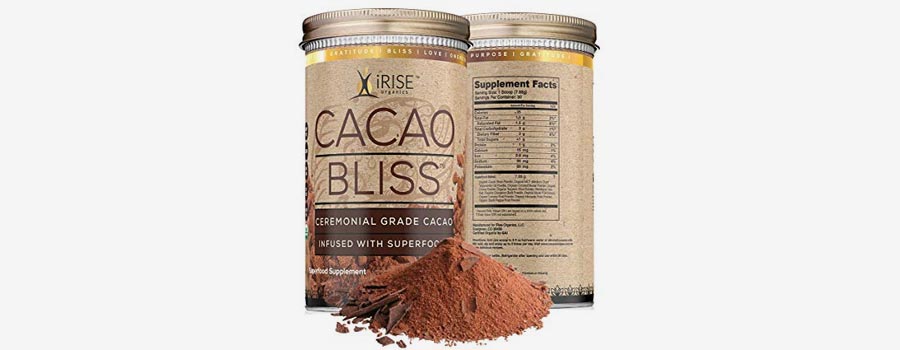
Find Lowest Price for Cacao Bliss on Amazon.com
The nourishment of the Cacao Bliss powder comes from raw Peruvian cacao beans, infusing the blend with a heaping dose of superfoods to take this product to the next level. Rather than simply delivering the flavanols to the body for antioxidant support, this formula helps consumers to beat hunger cravings for weight loss, while promoting higher energy levels. Along with cacao bean powder, consumers will find MCT oil, turmeric, and black pepper extract, among other ingredients. However, since all of these ingredients are in a Superfood blend, it is difficult to determine how much of all of the ingredients will shine.
A single scoop is all the user needs to get a full 30-calorie serving, which can be added to any drink or recipe. However, as flavanols can be destroyed in heat, consumers may not want to add this product to baked goods like brownies or cookies. A single can of Cacao Bliss is available from the iRISE Organics website for $59.95, but there is no subscription offered like the FlavaNaturals products.
Cocoa Polyphenols Extract by Swanson Ultra

Find Lowest Price for Cocoa Polyphenols on Amazon.com
The Cocoa Polyphenols Extract is a concentrated dose of cocoa polyphenols (just like the name says) to promote a healthy heart and a healthy mind. It doesn’t have nearly the same fat and sugar as what dark chocolate offers, condensing all of the powder into a capsule. Unlike Cacao Bliss, there are no extras in this blend, which allows consumers to solely get the potent benefits of using cocoa extract. Though there is no caffeine added, this type of powder naturally offers caffeine, so consumers that are unable to have this chemical may want to seek out one of the other products on this list.
Consumers need to take a daily two-capsule dose to get the desired effects. For a one-time purchase of Cocoa Polyphenols Extract, the total cost is $21.59 for a 30-capsule bottle. However, consumers that choose to subscribe for regular shipment will save 10% on the purchase, while getting free shipping.
Cacao Powder by ChocoVivo

Find Lowest Price for ChocoVivo on Amazon.com
The Cacao Powder superfood supplement, which the company interchangeably calls “cocoa powder” as well, is easy for consumers to digest, as it preserves the flavanols with a cold-pressed extraction process. In doing so, the company also preserves the natural calcium, iron, zinc, and other minerals that exist in the powder and that greatly benefit consumers. The powder naturally lifts the mood and increases the energy of the user but doesn’t create a massive caffeine crash in the process.
ChocoVivo is also a producer of full-spectrum cacao powder, but the two formulas are drastically different. The full-spectrum version hasn’t been separated from the natural fat content, which could help with good cholesterol levels. All beans used in their products go through a three-day fermenting period for reduced acidity and better flavanol preservation.
Consumers can purchase the cacao powder for $12.99 for a 16-ounce bag on the official ChocoVivo website.
Cocoa and Cacao Supplements with Bonus Features
Even though these products didn’t necessarily hit the mark for exclusively being a cocoa or cacao supplement, they still offer impressive benefits.
iQ2
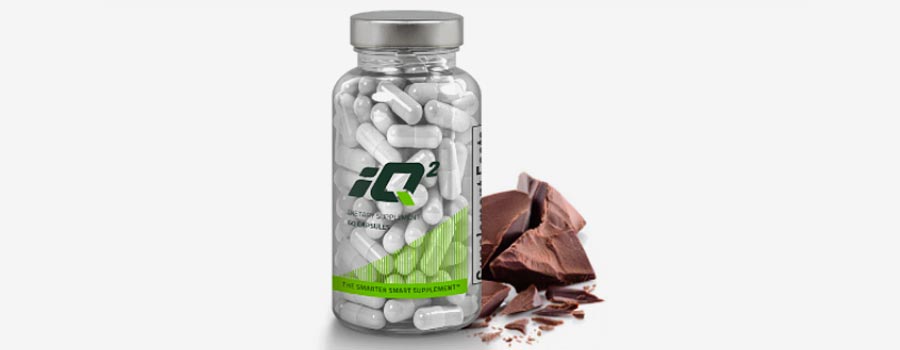
Find Lowest Price for iQ2 Cocoa Flavanols on Amazon.com
iQ2 is primarily meant to be used as a nootropic formula, improving focus, concentration, alertness, mental energy, and an overall better mood. The formula combines all of the benefits of cocoa flavanols with guarana, choline, vitamin B complex, and other ingredients for the cognitive support that consumers crave from a nootropic supplement. While the cocoa promotes better blood flow, the remaining ingredients can absorb more efficiently into the bloodstream to feel the full effects of the nootropic on the brain.
Right now, iQ2 is listed on Amazon for $54.95, providing the user with 30 servings (60 capsules).
Santa Barbara Chocolate

Find Lowest Price for Santa Barbara Chocolate on Amazon.com
The Santa Barbara Chocolate has, by far, the most cocoa flavanols of any product on this list, offering 2,200 mg of cocoa flavanols for just 10 grams (about one tablespoon of chocolate chips). These chocolate chips taste just like dark chocolate fudge but melt into a fresh taste that seems fairly similar to wheatgrass or fresh kale.
With its smooth dissolution, a three-pound bag of the chocolate chips is $49.00, though the official website sells as much as 66 pounds in a single case.
Cocoa Flavanols Research: Benefits and Side Effects
Flavanols are compounds that occur naturally and are typically found in plants and they can be present in certain food substances as well, such as raw cocoa and natural tea leaves. Those who are looking to give their body a boost may want to consider consuming more flavanols.
The Difference Between Flavanols and Flavonoids
When learning about flavanols, there is a high chance of coming across the terms “flavonoids” as well. As a primer, flavanols are a class of flavonoids, which generally plants compounds that are present in fruits and vegetables.
There are three different classes of flavanols: polymers, dimers, and monomers, also known as catechins. Catechins are primarily present in green and white tea, while dimers are present in black tea. Each class of flavanols has its own benefits.
Those who are looking to include more flavanols into their diet may want to turn to substances such as teas, grapes, apples, berries, red wine, and cocoa.
The Health Benefits of Flavanols
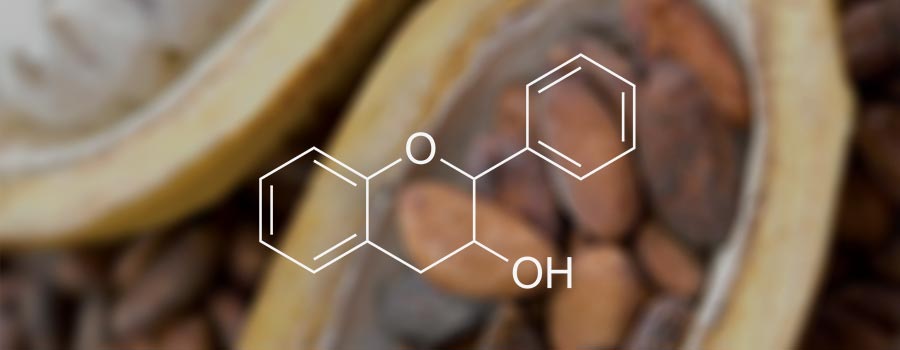
There are several health benefits associated with flavanols, which are as follows:
Linked to Improved Thinking Skills
According to Harvard Health, the flavanols in cocoa have been linked with improved thinking skills. The proposition is based upon a research study conducted on 90 healthy men ranging from ages 61 to 85. At the time of the study, the participants’ cognition was in good condition. They were directed to consume a special brew of flavanols on a daily basis. After an eight-week period, the participants who consumed the flavanols as directed showed an improvement on tests that measured their executive function, memory, and attention.
Linked to Reduction in Risk of Cardiovascular Disease
A study published by the University of Illinois suggests that there may be a connection to support the hypothesis that regular consumption of flavonoid-containing food substances may reduce the risk of cardiovascular disease.
Linked to a Positive Neurological Impact
A study by the Department of Internal Medicine at the University of Tubingen, Germany found that long-term flavanol consumption may have protective effects, and could have a positive impact on human cognition, mood, and behavior.
Potential Anti-Inflammatory Properties
Another study suggests that flavanols may have anti-inflammatory properties. The anti-inflammatory qualities may be due to the flavanols inhibiting enzymes or transcription, and may act as antioxidants as well.
Keep in mind that these are just a few of the potential benefits of flavanols. Further additional research into each of the benefits of flavanols is needed. These studies simply reveal a potential connection, and there is still a great deal more evidence that is needed for a conclusive determination.
The COSMOS Trial – Cocoa Supplement and Multivitamin Outcomes Study
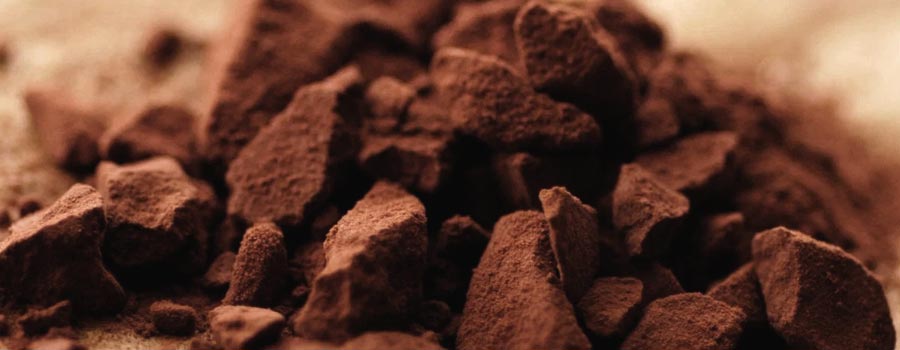
The COcoa Supplement and Multivitamin Outcomes Study is a clinical trial that is presently in the works at Brigham and Women’s Hospital. In the trial, about 22,000 men and women will be randomized to study the effects of cocoa flavanols as a daily supplement. The study aims to find out if the risk of heart disease is lowered by using a cocoa flavanol versus taking a common multivitamin.
Previous studies have shown promising results, but there is still a void for proven results. The only way to see exactly the impact that cocoa flavanol and multivitamin supplements have on the health of users with a large-scale trial, which is what COSMOS offers. The double-blind, placebo-controlled trial includes over 6,000 men over age 60 and over 12,000 women over age 65, including four years of treatment.
Multivitamins are more popular than any other dietary supplement in the US, and over a third of all adults in the country take one. The purpose of these supplements is ultimately to reduce any vitamin and mineral deficiencies, but some adults use it to reduce chronic disease as well. In a separate randomized test – the Physicians’ Health Study (PHS) II, the researchers found an 8% decrease in total cancer. However, the multivitamin in the study didn’t impact cardiovascular disease at all.
Brigham and Women’s Hospital is an affiliate of Harvard Medical School, and have collaborated with the Fred Hutchinson Cancer Research Center in Seattle, Washington to launch the study. The study is being funded by Mars Symbioscience and Pfizer Inc., though the National Institute of Health is offering support for ancillary services.
Mars and the Study of Cocoa Flavanols
To fully understand the impact that cocoa and cacao can have on the body, clarity over what these terms mean is necessary. Flavonoids are compounds that are found in and made by plants, but flavanols specifically are a subgroup of a bigger flavonoid group. Consumers can find this flavonoid type in cocoa, as well as in apples, berries, and tea, among other products.
Cocoa flavanols are found in the cacao plant, and the consumption of these flavanols has been linked with the healthy functioning of the cardiovascular system. However, the presence of flavonoids in cocoa and chocolate-based products can vary substantially, sometimes being rich in them to having almost none at all. During normal processing techniques, it is possible to destroy the flavanols, leaving consumers with a product that may taste good but offers none of the benefits.
Early on, many researchers believed that cocoa flavanols alone were capable of providing the health benefits of antioxidants, but current data shows otherwise. Several decades ago, scientists with Mars found a connection between increased nitric oxide production and the consumption of dietary flavanols. Additional research discovered that nitric oxide has an important role in promoting cardiovascular health.
Flaviola and Studying Flavanols
Another study on flavanols sheds a different light on these substances. The mystery surrounding cocoa flavanols is covered by 20 years of research, but the Flaviola project has taken on a “multidisciplinary, translational research approach” to fill in the gaps that the industry seems to have left behind. When the project began, the team set out to learn about the impact flavanols make on the metabolism, as well as how these compounds impacted the body’s cardiovascular function.
Flaviola broke down the results of the study into a booklet, video, and infographic illustration, as well as other articles that explained what the project found. Ultimately, the researchers determined the cocoa flavanols were capable of maintaining cardiovascular health in participants, specifically finding that blood pressure and blood cholesterol levels benefited the most.
Potential Side Effect Concerns with Too Much Flavanols
Those who decide to add more flavanols to their diet may want to be aware that the foods containing flavanols may not be beneficial in large quantities. In addition, according to online research publications, flavanols have the potential to cause headaches, anxiety, and headaches.
Overall, flavanols are substances that occur in cocoa, tea, grapes, wine, and berries. Adding flavanols may have potential health benefits, such as anti-inflammatory properties, enhanced cognition, reduction in risk of cardiovascular disease, and a positive neurological impact. Moreover, flavanols should be easy to add to one’s lifestyle, after all, who does not love a bit of chocolate and wine on a regular basis?
Product Testing Discovers Varying Cocoa Flavanols Amounts
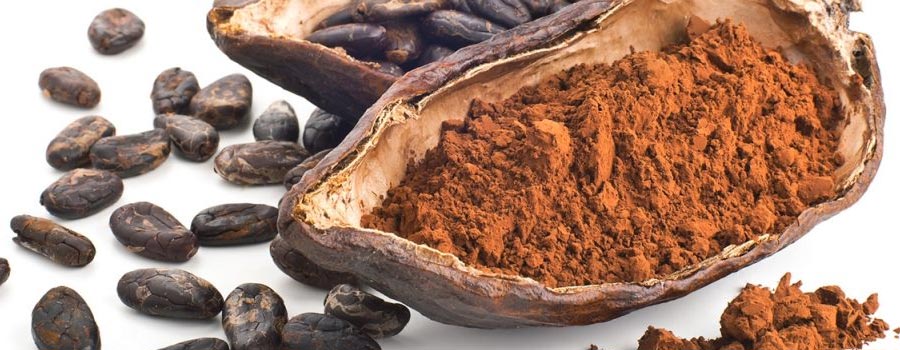
Chocolate is a multi-million-dollar industry, and there are many consumers with a sweet tooth for these types of products. However, the flavanols aren’t exactly consistent from one product to the next. What are flavanols? Why do they matter? How can they impact the efficacy and health benefits of chocolate? Learn all of that and more here.
-
Only subscribers to ConsumerLab.com will be able to view the names of the companies reviewed.
-
Flavanols are destroyed in with “dutching,” which is used to reduce bitterness.
All chocolate and cocoa products are not created equal, and a recent study confirms that the flavanol content “can vary tremendously.” Flavanols are a type of antioxidant, which seems like it should be a deciding factor in selecting a chocolate product. While knowing exactly how much of these antioxidants would be helpful for consumers, package labels don’t show any information about it, according to a dietary supplement testing company. To make matters worse, some of these products actually have toxic metals, like cadmium.
Cocoa powder is generally rich in flavanols in its natural state, but the process of dutching can destroy much of these antioxidants. Dutching is a process that helps to reduce the bitterness of cocoa powder, while making it darker. The powder is then used to create dark chocolate (using cocoa butter) or milk chocolate (using cocoa butter, milk, and sugar).
The website that recently evaluated these products in the market – ConsumerLab.com – preempts their results by stating that they are a private company, though this service is available to the public. However, since the original report on this matter was published by Nutrition Action, the only way that the specific information can be revealed is by becoming a subscriber for ConsumerLab.
Through the last three years, the website has reviewed cocoa products four times to see the flavanol content inside and to form recommendations for consumers. According to Nutrition Action, the daily recommended amount of flavanols is 200 mg, which promotes blood flow. Less than half of the 11 products with a “dark” chocolate label actually provided this recommended level with their portions. Out of 14 cocoa powders, five options had 200 mg flavanols or more, and only one in three cocoa nibs boasted the same. There were even ten dietary supplements with cocoa included in the research, but just two of them actually hit the mark.
Basically, consumers don’t really know what they are getting. High cacao levels don’t indicate higher flavanol levels either, it seems. There were four dark chocolates reviewed in the research by ConsumerLab with over 80% cacao but not even close to the recommended 200 mg of flavanols.
Frequently Asked Questions About Cocoa Flavanol
Q: What are cocoa flavanols?
A: Flavanols are bioactive compounds found in certain plant-based foods, including cocoa. Raw cocoa beans are particularly rich in cocoa flavanols. Flavonols are a sub-group of flavonoids.
Q: What’s the difference between flavonols and flavonoids?
A: Flavanols are a class of flavonoids. Flavanols can be found in a variety of fruits and vegetables – including cocoa. Flavonoids can be found in tea, citrus fruit, fruit juice, berries, red wine, apples, and legumes.
Q: How to get cocoa flavanols?
A: The best way to get cocoa flavanols is with cocoa powder that has been minimally processed. Ideally, your cocoa powder will not go through Dutch method processing, which reduces flavanol content. You can also get cocoa flavanols through the seeds of the cacao tree (cacao beans) or cocoa flavanols supplements.
Q: Where to buy cocoa flavanols?
A: You can buy cocoa flavanols supplements from Amazon, GNC, and other supplement retailers. You can also buy cocoa powder or cacao beans from supermarkets, specialty grocers, and various other online and offline retailers.
Q: What are the health benefits of cocoa flavanols?
A: Cocoa flavanols are linked to health benefits like improved blood pressure, better cardiovascular health, improved blood flow, improved cognitive function, and improved mood. There’s some evidence that cocoa flavanols also improve symptoms of type 2 diabetes or have cancer-protective properties.
Q: Where does cocoa powder come from?
A: Manufacturers make cocoa powder by crushing cocoa beans and removing the fat or cocoa butter.
Q: Where did cocoa powder come from?
A: The Mayan civilization of Central America was the first known civilization to have used cocoa powder. The Mayans used cocoa powder for medicinal purposes. Today, we’re seeing increased evidence behind those medical uses.
Q: What is the best source of cocoa flavanols?
A: The best source of cocoa flavanols are cocoa powder and cacao beans. You can also buy dark chocolate or cocoa flavanols supplements like CocoaVia.
Q: What products contain cocoa flavanols?
A: Cocoa powder and cacao beans are rich with cocoa flavanols. You can also buy supplements like CocoaVia, which contain concentrated cocoa flavanols extract.
Q: What foods contain cocoa flavanols?
A: Cocoa powder and cacao beans are rich with cocoa flavanols, and any foods containing these ingredients will also have cocoa flavanols, including dark chocolate and many chocolate products.
Q: What kind of cocoa powder is healthiest?
A: Any cocoa powder or cacao powder that emphasizes purity and minimal processing may be considered “healthy” due to its high levels of cocoa flavanols.
Q: What’s the difference between cocoa and cacao powder?
A: Cocoa is a chocolate powder made from roasted and ground cacao seeds. Cacao is the plant itself. Both cocoa and cacao powder come from the cacao plant and its seeds, although they’re made using different processes. Cacao powder is made by cold-pressing non-roasted cacao beans, while cocoa powder is raw cacao that has been roasted at high temperatures.
Q: What is better for you: cocoa or cacao powder?
A: Both cocoa powder and cacao powder have plenty of antioxidants that could improve cardiovascular health and boost skin health. Cacao powder has been less processed than cocoa powder and may retain more nutrients, although cocoa powder is cheaper and easier to find.
Q: What does Dutch processed mean?
A: Dutch processing is a manufacturing process used on cocoa beans. You might see this type of cocoa labeled as Dutch processed or alkalized cocoa. The process reduces acidity. During Dutch processing, manufacturers add an alkaline solution to the chocolate liquor, increasing the pH and making it more acidic. This creates a powder that is less bitter, sweeter, slightly darker in color, and more soluble in liquids.
Q: How much flavanols in cocoa powder?
A: Natural cocoa powder contains 30mg to 40mg of flavonols per gram of powder, or about 3% to 4% flavanols by weight.
Q: Is cocoa good for the brain?
A: Cocoa powder is linked to improved brain health. Some studies have shown that cocoa powder and cocoa flavanols can improve blood flow to the brain, enhancing cognition.
Q: What are the side effects of cocoa powder?
A: Cocoa contains caffeine, and many cocoa powder side effects are linked to caffeine, including anxiety, nervousness, restlessness, sleeplessness, and a fast heartbeat.
Q: Is cocoa good for weight loss?
A: Cocoa powder may help you lose weight by boosting your metabolism. Cocoa has been shown to raise metabolism, which means your body metabolizes fat more efficiently. Cocoa powder is also rich in fiber, which regulates blood sugar and removes waste from the body.
Q: Which is healthier cocoa or cacao?
A: Cacao is less processed than cocoa, and it typically retains more nutrients from the cacao plant. Cocoa goes through slightly more processing (it’s heated) and may have fewer nutrients. However, they have similar benefits overall, and cocoa powder is significantly cheaper and easier to find.
Q: Does cocoa make you gain weight?
A: Chocolate is high in calories, sugar, and fat, all of which can lead to weight gain. However, cocoa powder contains no fat or sugar. Cocoa powder has been linked more to weight loss than gain in multiple studies. When paired with healthy diet and exercise and consumed in normal amounts, cocoa powder can lead to weight loss – not gain. Remember: cocoa powder is made by crushing cacao beans and removing the fat or cocoa butter, which means cocoa powder doesn’t have the same calories, sugar, and fat as chocolate.
Q: Is cocoa powder fattening?
A: Cocoa powder contains no fat or sugar, which means it should not be fattening when consumed in normal dosages.
Q: Does cocoa help you sleep?
A: Unsweetened cocoa powder contains tryptophan, which could help you sleep better. However, it also contains caffeine, which could keep you awake.
Q: Is there caffeine in cocoa powder?
A: Cocoa powder naturally contains a significant amount of caffeine. A 100g serving of unsweetened cocoa powder has 230mg of caffeine, which is the same caffeine as 2 to 3 cups of coffee.
Q: Is cocoa powder keto?
A: Cocoa powder can be an effective way for keto dieters to add flavor or texture to a shake. However, cocoa powder has minimal amounts of fat and protein. A one tablespoon (0.2 oz) serving of unsweetened cocoa powder contains 0.7g of fat, 3.1g of carbs, and 1.1g of protein.
Q: Are cocoa flavanols found only in dark chocolate?
A: Cocoa flavanols can be found in a variety of chocolate products, although dark chocolate is particularly rich in cocoa flavanols. Dark chocolate contains 45 to 80% cocoa solids, while milk chocolate contains 5 to 7%.
Q: What are the side effects of dark chocolate?
A: Side effects of dark chocolate are similar to the side effects of caffeine. Consuming too much dark chocolate could lead to sleeplessness, restlessness, nervousness, and a fast heartbeat, among other side effects.
Q: Why is dark chocolate not good for you?
A: Dark chocolate is a concentrated source of calories, and it may not be good for you when consumed in large doses. Too much dark chocolate can lead to weight gain. Generally, however, dark chocolate is full of beneficial flavonols and good when consumed in small doses.
Q: Is dark chocolate good for your kidneys?
A: The flavonols in dark chocolate could improve kidney function by boosting blood vessel function. Dark chocolate can improve cardiovascular health, and better cardiovascular health can improve the function of all your organs – including your kidneys.
Q: Does dark chocolate reduce belly fat?
A: Yes, dark chocolate can reduce belly fat in certain ways. Some studies show that dark chocolate reduces cravings for other sweet or salty treats, which could reduce belly fat. The flavonols in dark chocolate are also linked with weight loss and improved cardiovascular health, both of which can reduce belly fat.
Q: Can I make my own cocoa flavanols capsules?
A: Some people make their own cocoa flavonol capsules at home by adding cocoa powder to capsules. However, you should be careful with dosages whenever you make your own capsule supplements at home.
Q: Can you take too much cocoa flavanols?
A: Yes, you can take too much cocoa flavanols. Cocoa contains theobromine, which can be toxic to humans at high dosages (and toxic to dogs at much lower dosages). Cocoa also contains caffeine, and too much caffeine can be dangerous at high dosages.
Q: How to consume cocoa flavanols?
A: You can get cocoa flavanols through cocoa powder, cacao powder, or dark chocolate. There are also cocoa flavanol supplements. Ordinary chocolate, including milk chocolate, also has small amounts of cocoa flavanols.
Q: How do cocoa flavanol supplements work?
A: Cocoa flavanols have become trendy in recent years. While many people get cocoa flavanols through cocoa or cacao powder, you can also take a cocoa flavanol supplement like CocoaVia, which comes in the form of capsules, drink mixes, and snack squares.
Q: What is CocoaVia?
A: CocoaVia is the best-known cocoa flavanol supplement available today. CocoaVia is a subsidiary brand of Mars, Incorporated. You can buy CocoaVia capsules, drink mixes, and snack squares with cocoa flavanols.
Q: Are cocoa flavanols backed by science?
A: Scientists at Mars, Incorporated (yes, the candy/chocolate company) have been leading cocoa flavanol research over the past 20 years, resulting in over 150 scientific papers. These papers include 30 clinical studies linking cocoa flavanols to heart, brain, and total body health benefits. Overall, cocoa flavanols are among the most-researched plant-based nutrients in the world.
Q: Do cocoa flavanols really improve heart health?
A: This double-blind, randomized, placebo-controlled trial published in The British Journal of Nutrition in 2015 found that cocoa flavanols improve heart health in healthy men and women. Cocoa flavanols improve endothelial function and Framingham Risk Score, improving cardiovascular health. Other studies have shown that cocoa flavanols enhance other cardiovascular metrics.
Q: Do cocoa flavanols really improve brain health?
A: This study published in Nature Neuroscience in 2014 found that cocoa flavanols enhance dentate gyrus function, improving cognition in older adults. Other studies have shown that cocoa flavanols improve blood flow to the brain and enhance cognition in other ways.
Q: Can cocoa flavanols improve overall health?
A: This study published in The American Journal of Clinical Nutrition in December 2015 found that the consumption of cocoa flavanols was linked to “positive health effects” overall. Researchers also found that cocoa flavanols were well-tolerated in healthy adults over a 12-week period.
Final Word on Cocoa Flavanols
By now, it is easy to see the world is yet to awake to the power and potential of cocoa flavanol supplementation. The top 5 cocoa flavanol supplements listed above are the best products that supply the purest source of cocoa flavanols.
Advanced Living will continue to update this review of cocoa flavanols when more research is made available.
















